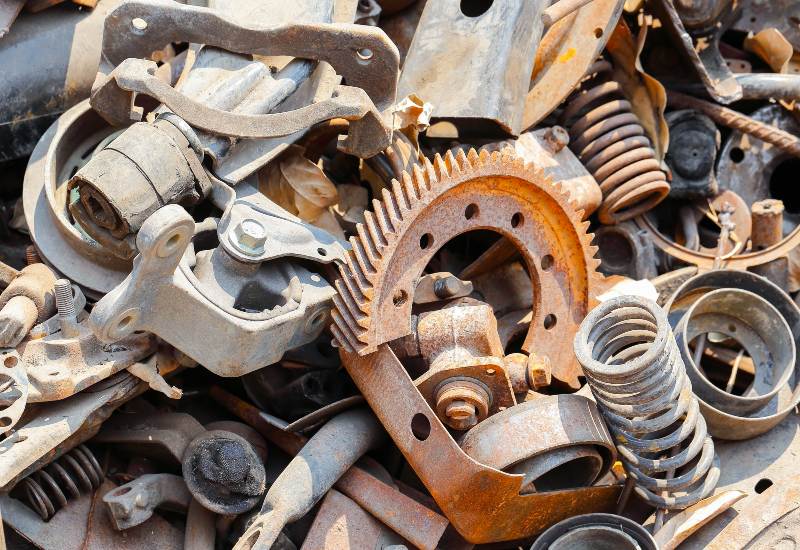Can You Scrap Rusty Metal?
Can You Scrap Rusty Metal in Vancouver?
When considering how best to dispose of metals, one question we are often asked is whether North Star Metal Recycling can recycle metals that have begun to rust.
What are Rusty Metals?
Rusty metals are metals that have undergone a chemical reaction known as oxidation, which occurs when metal is exposed to oxygen and moisture for an extended period. This process is most associated with iron and its alloys, including steel. Rust is essentially iron oxide, a reddish-brown compound that forms when iron reacts with oxygen in the presence of water or air moisture.
Rust formation is an electrochemical process that begins with the metal losing electrons to oxygen in a moist environment, which can significantly affect the physical properties of the metal over time.
Why Does Metal Rust?
Simply put, metals begin to rust over time because of the oxidative effects of exposure to water and air. Here’s how:
- Water and Oxygen Exposure: When iron (or an iron alloy) is exposed to water and oxygen, it initiates a chemical reaction. Water acts as a medium allowing electrons to flow through it, and oxygen serves as the electron acceptor.
- Electron Transfer: In the presence of water and oxygen, iron atoms lose electrons, which are gained by oxygen atoms. This electron transfer process is the basis of the oxidation reaction.
- Formation of Iron Oxide: The loss of electrons from iron forms positively charged iron ions, which react with the negatively charged oxygen ions (from oxygen atoms that have gained electrons). This reaction produces iron oxide, commonly known as rust.
Rust not only changes the color and appearance of the metal but also deteriorates the metal’s structural integrity over time. This weakening can lead to significant damage in structures, machinery, and equipment where iron or its alloys are used.

What Metals are Recyclable?
Most metals are recyclable. Recycling metals is highly efficient and environmentally beneficial since it saves energy, reduces the need for mining, and decreases greenhouse gas emissions. The recycling process can also be repeated multiple times without degrading the metal’s properties. Here are some commonly recycled metals, grouped into two main categories: ferrous metals and non-ferrous metals.
Ferrous Metals
These contain iron and are magnetic. They are commonly recycled and include:
- Steel: Found in construction materials, cars, appliances, and food cans.
- Iron: Used in construction, automotive, and machinery. Cast iron and wrought iron are examples.
Non-Ferrous Metals
These do not contain iron, are not magnetic, and are generally more resistant to corrosion. They include:
- Aluminum: Common in cans, foil, kitchen utensils, window frames, and airplane parts.
- Copper: Highly valued and found in electrical wiring, pipes, roofing materials, and inside air conditioners.
- Brass: A copper-zinc alloy used in fixtures, door handles, keys, and musical instruments.
- Lead: Found in batteries, pipes, and some roofing materials. It is hazardous and must be handled with care during recycling.
- Zinc: Used for galvanizing steel or iron to prevent rust, and in die-casting alloys.
- Tin: Often used to coat steel to prevent corrosion and in various alloys like bronze (copper and tin).
- Nickel: Used in stainless steel, coins, and batteries.
- Precious metals: Such as gold, silver, platinum, and palladium, which are found in jewelry, electronic components, and catalytic converters.
Can you Scrap Rusty Metals?
Yes, you can scrap rusty metal. Rust affects mostly iron and its alloys, like steel, causing them to corrode over time when exposed to oxygen and moisture. While rust can degrade the appearance and structural integrity of metal, it doesn’t prevent the metal from being recycled. North Star Metal Recycling does accept rusty metals, but there are a few things to keep in mind:
- Value: Rusty metal might be valued lower than clean metal because the rust indicates corrosion and potential loss of structural integrity, which can affect the recycling process. The actual weight of the usable metal is less, as rust is essentially iron oxide and not the pure metal that recyclers are after.
- Type of Metal: While ferrous metals (iron and steel) are commonly recycled even when rusty, the process for non-ferrous metals might differ. Metals like copper, aluminum, and brass don’t rust in the same way, but they can corrode or tarnish. These materials are often recycled at a high value, and slight surface corrosion may not significantly impact their scrap value.
- Recycling Process: Rusty metals are melted down and purified during the recycling process, removing any impurities, including rust. This makes even heavily corroded items useful for recycling, as the metal can still be recovered and reused.
Contact North Star Metal Recycling Today to Get Started
If you have more questions about our metal recycling services, check out our FAQs or just give us a call. North Star Metal Recycling has been Metro Vancouver’s trusted choice for metal recycling, purchasing, and sales since 1950. We offer the best metal and copper prices in our area based on current fair market values, which fluctuate daily. We weigh everything right in front of you on a precise digital scale and pay top dollar. We’re happy to answer any questions you may have and to help get you started with giving back to the environment through metal recycling. Contact us today.
